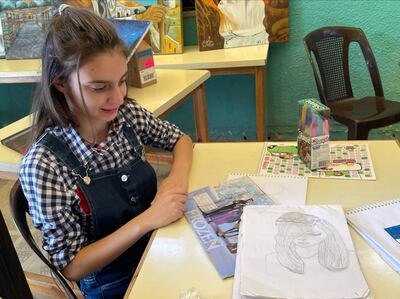Retired footballer Khalil Salman rose to stardom as a midfielder for a premier football club in the Jordanian capital Amman in the 1990s, after he and his family had to leave Kuwait.
Today he coaches children, including refugees from Syria, at Makani, an internationally funded learning centre in a low-income district of Amman.
“They play really well,” Salman says, pointing out Bilal, 12, a winger from the Syrian city of Homs, whom he considers as one of the best in the group, along with the Jordanian Bakkar twins, also 12, who play midfield.
The centre encapsulates the different array of people working in Jordan to help about 620,000 Syrian refugees in the country.
Jordan's economy, particularly its vital travel and tourism sector, was hit hard by the global coronavirus pandemic, which affected the ability of the government and international agencies to assist refugees.
The continuing conflicts and economic crises in parts of the Middle East, as well as western focus on the Ukraine war, have further disadvantaged refugees in Jordan and across the Levant.
The civil war in Syria is in its 12th year.
It started with peaceful protests against five decades of Al Assad family rule in March 2011. The demonstrations turned into armed revolt by the end of the year, after the regime used deadly force on a large scale against civilians.
Finding their place
The Amman centre first opened in the 1950s as a shelter for Palestinian refugees after Hasan Hamlan Al Daaja, who was a Jordanian tribal leader, donated the property to charity.
Makani, the Arabic word for "my place", is part of the Jordanian operation of the UN's children fund, Unicef.
Emirati billionaire-philanthropist Abdul Aziz Al Ghurair partly funds the centre, along with western governments. A Jordanian psychology specialist manages it, with many of the staff being from refugee backgrounds.
Children take maths, computer, languages and other courses at the centre to improve their performance in school, or compensate for not attending any classes at all.
About two-thirds of the refugees in Jordan grew up without attending school.
They have little chance to reach university, partly because of the costs. Finding a job in skilled sectors is also difficult because of labour and other restrictions on refugees in Jordan.

Mr Salman in the past coached a Syrian boy called Abdulrahman Al Baba, who may become an exception.
He says Abdulrahman was so good in football that a private English school in Amman took him to study free of charge.
“I am hearing that he will be going to Britain. He could make it big there,” says Mr Salman, whose family is originally Palestinian.
They fled to Jordan when Israel was created in 1948 before making their way to Kuwait. They were forced to return to Jordan as a consequence of Yasser Arafat having supported the Iraqi invasion of Kuwait.
"I am familiar with some of what these kids go through," Mr Salman says.
Many of the children were not born when the revolt started in southern Syria in 2011.
Jordan closed its borders to Syrian refugees in 2014, but normalised ties with the government of President Bashar Al Assad two years ago.
The authorities in Amman, however, have not pressured the refugees to return home, unlike in Lebanon and Turkey, which signalled last month that it could also normalise ties with the Al Assad government.
The centre held an open-day on Friday, during a visit by Mr Al Ghurair. He was accompanied by Muhammad Al Jasser, head of the Jeddah-based Islamic Development Bank and another influential advocate for supporting refugee education.
Solace in music
The centre has a band that gives music therapy. Music and art lessons are also available.
"It helps the kids gain confidence," says music teacher Mohammad Brayk.

He grew up in Baqaa, the largest Palestinian refugee camp in Jordan, and worked as a primary schoolteacher in Al Dammam in eastern Saudi Arabia.
“Music teaching was banned at that time, but I brought an organ and played Jordanian folk music while the students exercised during the sports class,” Mr Brayk says.
His assistant, Aya Al Hariri, 25, was born in Busra Al Harir, a rural town in southern Syria. She fled to Jordan when she was a teenager early in the conflict.
At that time Al Hariris were one of the main families in southern Syria who led the peaceful resistance to the regime. Many of them were killed or disappeared. Al Hariri's uncle, a teacher, vanished after he was seized at a regime roadblock.
“Music helped me cope with my new life,” says Al Hariri, who is learning the guitar. She has large brown eyes.
A hint of sadness runs through them.










